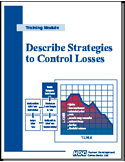Describe Strategies to Control Losses
|

Total Pages: 49
|
Training Objectives
Upon completion of this loss control training kit, you will be able to:
| † |
Identify the reasons organizations implement loss control measures
|
| † |
Describe three sources of loss in the workplace
|
| † |
Explain the importance of identifying measurable consequences
|
| † |
Describe the two factors affecting risk
|
| † |
Describe methods to reduce the risk of incurring losses
|
| † |
Describe factors to consider when selecting controls
|
| † |
Identify the areas addressed by a comprehensive loss control program
|
|
|
Table of Contents
|
1
|
Introduction
|
1
|
|
2
|
Identify Loss
|
3
|
|
|
2.1 Defining Loss
|
3
|
|
|
2.2 Causes of Loss
|
4
|
|
|
2.3 Consequences of a Loss Incident
|
5
|
|
3
|
Assessing the Risk of Loss
|
6
|
|
|
3.1 Definitions
|
6
|
|
|
3.2 Basic Risk Concepts
|
7
|
|
|
3.3 Risk Assessment/Analysis Tools
|
9
|
|
4
|
Reducing Risk
|
12
|
|
|
4.1 Organizational Priorities for Reducing Risk
|
12
|
|
|
4.2 Control Alternatives
|
14
|
|
|
4.3 Selecting Controls
|
17
|
|
|
4.4 Monitoring Control Effectiveness
|
19
|
|
5
|
Loss Management Programs
|
20
|
|
|
5.1 Stand-Alone Programs
|
20
|
|
|
5.2 Comprehensive Integrated Programs
|
22
|
|
6
|
Summary
|
23
|
|
7
|
Self Check
|
25
|
|
8
|
Self Check Answers
|
28
|
|
9
|
Glossary
|
28
|
|
|
Appendix 1: Hazard and Operability Study (HAZOP)
|
32
|
|
|
Appendix 2: Failure Mode Effects Analysis (FMEA)
|
35
|
|
|
Appendix 3: Fault Tree Analysis (FTA)
|
37
|
Download sample (PDF)
Back to the description.
Back to List of Training Kits.
|
|




